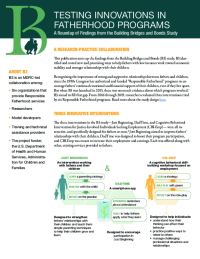Testing Innovations in Fatherhood Programs
A Roundup of Findings from the Building Bridges and Bonds Study

 To continue building an understanding of what interventions support fathers and their families, the U.S. Department of Health and Human Services’ Office of Planning, Research, and Evaluation, with funding from the Office of Family Assistance, engaged a team led by MDRC to conduct the Building Bridges and Bonds (B3) study. B3 partnered with fatherhood experts and practitioners to identify new and promising approaches to supporting fathers working toward economic stability and improved relationships with their children.
To continue building an understanding of what interventions support fathers and their families, the U.S. Department of Health and Human Services’ Office of Planning, Research, and Evaluation, with funding from the Office of Family Assistance, engaged a team led by MDRC to conduct the Building Bridges and Bonds (B3) study. B3 partnered with fatherhood experts and practitioners to identify new and promising approaches to supporting fathers working toward economic stability and improved relationships with their children.
The study team team tested three innovative, interactive, skill-building approaches that addressed parenting and economic stability in the context of existing fatherhood programs:
- The Just Beginning intervention invited fathers with their young children to participate in one-on-one parenting training sessions that used engaging skill-building videos and father-child play activities to strengthen fathers’ relationships with their children.
- DadTime, a smartphone application informed by behavioral science, was designed to improve fathers’ participation in Just Beginning. It offered Just Beginning–related reminders, planning tools to help fathers apply what they learned, and encouragement.
- Cognitive Behavioral Intervention for Justice Involved Individuals Seeking Employment (CBI-Emp) was implemented with fathers with recent involvement in the criminal justice system. The workshop paired cognitive behavioral skill building with traditional job-readiness services to help fathers understand how their thinking can affect their behavior, including within professional situations and interpersonal experiences.
For the B3 study, three organizations with existing Responsible Fatherhood programs implemented Just Beginning and DadTime in addition to their usual services. Three other organizations with existing fatherhood programs implemented CBI-Emp in addition to their usual services. Fathers were randomly selected to participate in one of two groups: One group was eligible to receive the organizations’ usual services, and the other was eligible to receive Just Beginning or CBI-Emp in addition to the usual services. Some of the fathers who were eligible for Just Beginning were also randomly selected to access the DadTime app during their participation in Just Beginning.
Primary Research Questions
The B3 study aimed to examine the feasibility and effectiveness of adding innovative interventions to the fatherhood programs organizations already offered. The study team asked questions about how the interventions were implemented and whether they achieved their intended outcomes:
- What were the elements needed to support the implementation of the added interventions within each existing program?
- Does a parenting program that works with fathers and young children together generate more positive effects on parenting and father-child relationships than standard parenting program approaches that do not involve the young children?
- What was the effect of the DadTime intervention on Just Beginning program participation rates?
- Does adding CBI-Emp to usual job-readiness services have an effect on fathers’ employment and earnings, involvement in the criminal justice system, or coparent relationship quality, and does it affect more distant outcomes such as child support payment and father-child relationships?
Findings and Highlights
- The parenting intervention with children, Just Beginning, did not measurably affect father-child relationships. The fatherhood programs were moderately successful in engaging fathers, coparents, and young children in Just Beginning, with 54 percent of fathers in the program group completing at least one Just Beginning session and 37 percent completing at least four sessions (considered adequate exposure to the curriculum). However, the Just Beginning intervention did not produce statistically significant effects on measures of father-child relationship quality, on fathers’ parenting confidence, nor on levels of father-child contact.
- Activation was a barrier to using the DadTime app to improve engagement. Program staff members played an essential role in offering and activating DadTime on fathers’ phones. Fewer than 50 percent of fathers activated the app, so most did not have access to its features. The DadTime study found no evidence that the app improved attendance in Just Beginning—either for the first session or overall.
- On average, the cognitive behavioral skill-building supplement, CBI-Emp, did not significantly affect fathers’ outcomes beyond what programs already did. The programs were moderately successful in engaging fathers in CBI-Emp, with about 70 percent of fathers in the program group attending at least one CBI-Emp session and about 44 percent receiving adequate exposure to the intervention (defined as attending 12 of the first 14 sessions). An exploratory, program-level analysis indicated participation levels were highest among fathers in the New York City–based program. According to data reported by fathers, CBI-Emp did not produce statistically significant effects on any of the prespecified outcome measures of employment, involvement in the criminal justice system, or relationships with coparents in the pooled analysis of all CBI-Emp study organizations. An exploratory analysis revealed better outcomes on measures of employment and involvement in the justice system in the New York City–based program.
- Organizations were able to adapt new interventions to their usual program services. The B3 experience showed that programs can somewhat successfully encourage fathers to participate in interventions that they did not seek out. Attendance at the first session of Just Beginning and CBI-Emp was an important indicator of receiving adequate exposure to either intervention. Furthermore, adding new program components—like Just Beginning or CBI-Emp—may not reduce participation in existing fatherhood services.
- The tested interventions may not be appropriate or effective for all fathers seeking services from fatherhood programs. Targeting a more specific group of fathers may yield better outcomes.







